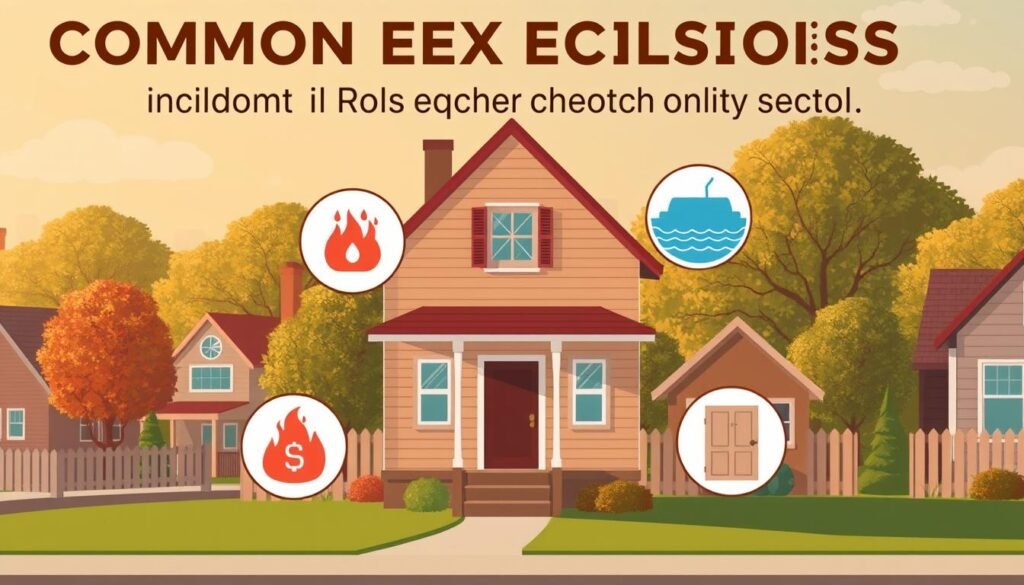Did you know that the global short-term rental market is expected to reach a staggering $113 billion by 2027? As more individuals embrace the flexibility and financial benefits of vacation rentals, the demand for comprehensive insurance coverage to protect these investments has never been higher.
This comprehensive guide introduces the world of short-term rental insurance, exploring the essential aspects that every property owner should consider. Whether you’re new to the vacation rental industry or a seasoned player, understanding the nuances of home sharing insurance can make all the difference in safeguarding your investment and providing peace of mind.
Key Takeaways
- The global short-term rental market is projected to reach $113 billion by 2027, underscoring the growing importance of vacation rental insurance.
- Short-term rental insurance provides crucial financial protection for property owners, covering potential risks such as property damage, liability claims, and loss of income.
- Airbnb insurance and other home sharing insurance policies help mitigate the unique challenges of the vacation rental industry, offering specialized coverage tailored to your needs.
- Understanding the key components of short-term rental insurance, including coverage limits, deductibles, and additional coverages, will help you make informed decisions when selecting the right policy.
- Researching insurance providers, comparing quotes, and asking the right questions can ensure you find the most comprehensive and cost-effective vacation rental insurance solution for your property.
Understanding Short-Term Rental Insurance
As a property owner engaged in the thriving short-term rental market, understanding the importance of specialized insurance coverage is crucial. Short-term rental insurance differs significantly from standard homeowners policies, addressing the unique risks associated with hosting guests on a temporary basis.
What is Short-Term Rental Insurance?
Short-term rental insurance is a tailored policy designed to protect property owners who offer their homes, apartments, or other accommodations for short-term stays, like those booked through platforms such as VRBO or Airbnb. These policies typically cover property damage, liability, and loss of income in the event of unforeseen incidents during a guest’s stay.
Why Do You Need It?
The short-term rental market has exploded in recent years, and with it, the need for specialized insurance coverage. Standard homeowners or landlord policies may not provide adequate protection for the increased risks that come with hosting guests, such as VRBO insurance or short-term rental liability coverage. Investing in a dedicated short-term rental policy can safeguard your property, your finances, and your peace of mind.
| Homeowners Insurance | Short-Term Rental Insurance |
|---|---|
| Designed for owner-occupied properties | Tailored for properties used for short-term rentals |
| May not cover damages or liability from guests | Provides coverage for guest-related incidents |
| Limited coverage for loss of rental income | Protects against lost rental revenue |
By investing in the right short-term rental liability coverage, you can safeguard your property, your finances, and your peace of mind, ensuring a successful and worry-free short-term rental experience for both you and your guests.
Types of Short-Term Rental Insurance Policies
As a short-term rental property owner, it’s crucial to understand the various insurance policies available to protect your investment and your guests. From vacation rental property protection to guest injury protection, the right insurance coverage can provide invaluable financial safeguards. Let’s explore the primary types of short-term rental insurance policies you should consider.
Property Insurance
Property insurance is the foundation of any short-term rental insurance plan. This coverage protects your rental property from unexpected damages, such as natural disasters, fire, or vandalism. It can also cover the cost of repairs and replacement of your property, furniture, and other belongings. Investing in a comprehensive property insurance policy ensures your vacation rental property is well-protected.
Liability Insurance
Liability insurance is another essential component of short-term rental coverage. This policy safeguards you from legal liability in the event of guest injuries or accidents on your property. Vacation rental property protection through liability insurance can cover medical expenses, legal fees, and even settlements, giving you peace of mind and financial security.
Loss of Income Insurance
As a short-term rental property owner, your income can be disrupted by unexpected events, such as property damage or local natural disasters. Guest injury protection through loss of income insurance can help cover the costs associated with temporary closures or cancelations, ensuring your rental business remains financially stable.
By understanding these key types of short-term rental insurance policies, you can build a comprehensive coverage plan that protects your investment, your guests, and your income. Investing in the right insurance can provide the financial security and peace of mind necessary to thrive in the dynamic short-term rental market.

Key Components of Short-Term Rental Insurance
When it comes to short-term rental insurance, understanding the key components of your policy is crucial. These elements can significantly impact the level of rental income protection and Airbnb insurance coverage you receive. Let’s dive into the details.
Coverage Limits
Coverage limits determine the maximum amount your insurance provider will pay out for a covered claim. These limits typically apply to various aspects of your policy, such as property damage, liability, and loss of rental income. Carefully reviewing and selecting appropriate coverage limits can ensure you’re adequately protected in the event of unexpected incidents.
Deductibles
The deductible is the amount you’ll need to pay out-of-pocket before your insurance coverage kicks in. Higher deductibles can lower your premium costs, but they also increase your financial responsibility in the event of a claim. Finding the right balance between deductible and premium can be a strategic decision based on your risk tolerance and financial circumstances.
Additional Coverages
Many Airbnb insurance policies offer additional coverage options that can enhance your protection. These may include coverage for damage to personal belongings, loss of rental income due to cancellations, and even legal liability protection. Exploring these supplementary coverages can help tailor your rental income protection to your specific needs.
| Coverage Element | Description | Importance |
|---|---|---|
| Coverage Limits | The maximum amount your insurer will pay for a covered claim. | Ensures adequate financial protection in the event of an incident. |
| Deductibles | The amount you pay out-of-pocket before your insurance coverage kicks in. | Balances premium costs and financial responsibility in claims. |
| Additional Coverages | Supplementary protection options that can enhance your rental income protection. | Tailors your Airbnb insurance to your specific needs. |

By understanding these key components of short-term rental insurance, you can make informed decisions and ensure your rental income protection and Airbnb insurance coverage meet your unique needs.
Benefits of Short-Term Rental Insurance
Securing the right vacation rental insurance or home sharing insurance can provide a multitude of advantages for short-term rental property owners. From financial protection to enhanced guest trust, investing in the right coverage can make all the difference in safeguarding your investment and creating a positive experience for your guests.
Financial Protection
One of the primary benefits of short-term rental insurance is the financial shield it provides. In the event of property damage, theft, or liability claims, the right policy can ensure that you are not left shouldering the entire burden. This financial protection can give you peace of mind and allow you to focus on delivering an exceptional guest experience.
Peace of Mind
Owning a short-term rental property can be rewarding, but it also comes with its fair share of risks. With the right insurance coverage in place, you can rest assured that your investment is protected. This peace of mind can free you from the constant worry of unexpected events, enabling you to approach your business with a more positive and proactive mindset.
Enhanced Guest Trust
When guests book your short-term rental, they want to feel secure and confident in their decision. By demonstrating your commitment to safety and responsible management through the implementation of appropriate vacation rental insurance or home sharing insurance, you can enhance the trust and satisfaction of your guests. This, in turn, can lead to positive reviews, repeat bookings, and a stronger reputation within the short-term rental community.

“Investing in the right insurance coverage for your short-term rental property is not just a smart business decision; it’s a testament to your dedication to provide a safe and enjoyable experience for your guests.”
Common Exclusions in Short-Term Rental Insurance
As a property owner managing a short-term rental, it’s crucial to understand the common exclusions in your VRBO insurance policy. These exclusions can leave you vulnerable to unexpected costs and financial liabilities if you’re not prepared. Let’s explore the three most significant areas of concern: natural disasters, intentional damage, and regular maintenance issues.
Natural Disasters
Many short-term rental insurance policies exclude coverage for damage caused by natural disasters, such as earthquakes, floods, hurricanes, or wildfires. This means that if your property sustains significant damage from these events, you may have to bear the full cost of repairs or replacement. It’s essential to review your policy carefully and consider purchasing additional coverage for natural disaster protection if it’s not already included.
Intentional Damage
Sadly, instances of intentional damage by guests are not uncommon in the short-term rental industry. This can range from vandalism to theft. Unfortunately, many VRBO insurance policies exclude coverage for this type of intentional damage. To protect yourself, it’s crucial to have robust liability coverage that can help you recover the costs associated with guest-related incidents.
Regular Maintenance Issues
Routine maintenance and upkeep of your short-term rental property are essential, but they can also be costly. Many insurance policies exclude coverage for issues related to regular maintenance, such as wear and tear, appliance breakdowns, or plumbing problems. It’s important to factor these ongoing expenses into your budget and consider whether your short-term rental liability coverage adequately addresses these potential risks.
Understanding the common exclusions in your short-term rental insurance policy is the first step in ensuring that you’re properly protected. By being aware of these gaps in coverage, you can take proactive measures to mitigate your risks and safeguard your investment.

How to Choose the Right Insurance Provider
Securing the right insurance coverage for your vacation rental property is crucial to protect your investment and provide peace of mind. When selecting an insurance provider, it’s important to thoroughly research your options, compare quotes, and review customer feedback to make an informed decision.
Researching Options
Begin by compiling a list of potential insurance providers that specialize in vacation rental property protection or Airbnb insurance. Look for companies with experience and a strong reputation in the short-term rental market. Explore their websites, read online reviews, and gather information about their coverage options, policy features, and customer service.
Comparing Quotes
- Request quotes from several insurance providers to compare pricing and coverage details side-by-side.
- Consider factors such as coverage limits, deductibles, and any additional or specialized coverages that may be important for your specific vacation rental property.
- Evaluate the overall value proposition of each quote, not just the price, to ensure you’re getting the best protection for your investment.
Checking Reviews
Consult online review platforms to gather insights into the customer experience with each insurance provider. Look for feedback on claim handling, responsiveness, and overall satisfaction. This can help you identify providers with a reputation for reliable service and fair claims processing.
| Insurance Provider | Coverage Limits | Deductible | Customer Ratings |
|---|---|---|---|
| Insure My Rental | $1,000,000 | $500 | 4.8/5 |
| Vacation Rental Pros | $500,000 | $1,000 | 4.2/5 |
| Rental Protector | $750,000 | $750 | 4.5/5 |
By thoroughly researching your options, comparing quotes, and reviewing customer feedback, you can make an informed decision and select the insurance provider that best meets the unique needs of your vacation rental property.

Questions to Ask Your Insurance Agent
When it comes to guest injury protection and home sharing insurance, it’s crucial to have a comprehensive understanding of your coverage. By asking the right questions, you can ensure that your insurance policy meets your specific needs and provides the necessary protection for your short-term rental business.
Coverage Clarifications
Start by clarifying the scope of your coverage. Ask your insurance agent about the specific types of incidents and damages that are covered under your policy. Understand the limits of your liability coverage and the extent of protection for your guests. Additionally, inquire about any exclusions or limitations that may apply to your policy.
Claims Process
- Familiarize yourself with the claims process, including the steps to file a claim and the expected timelines for resolution.
- Inquire about the documentation required to support a claim, such as incident reports, receipts, or proof of damages.
- Understand the communication protocols during the claims process and how you will be informed of updates and decisions.
Policy Modifications
- Discuss the possibility of modifying your policy to better suit your evolving needs, such as increasing coverage limits or adding additional coverages.
- Inquire about the process and timeline for making changes to your policy, including any associated fees or adjustments to your premium.
- Explore options for seasonal adjustments or temporary coverage modifications to accommodate changes in your short-term rental operations.

By addressing these critical questions with your insurance agent, you can ensure that your home sharing insurance provides the necessary protection and peace of mind for your short-term rental business.
Cost Factors for Short-Term Rental Insurance
When it comes to protecting your short-term rental investment, securing the right insurance coverage is crucial. However, the cost of such policies can vary significantly depending on several factors. Understanding these cost drivers can help property owners budget their rental income protection and VRBO insurance expenses more effectively.
Location-Based Pricing
The geographical location of your rental property plays a significant role in determining the cost of your insurance premiums. Factors such as the local crime rate, natural disaster risks, and regional regulations can all influence the pricing. Properties situated in high-risk areas or regions with stringent short-term rental laws may typically require higher insurance costs to mitigate these unique challenges.
Property Type Considerations
The type of property you are renting out can also impact the insurance costs. For instance, insuring a single-family home may differ from insuring a multi-unit apartment or a luxury vacation rental. The value of the property, the number of guests it can accommodate, and the amenities it offers can all contribute to the overall insurance pricing.
Seasonal Adjustments
Short-term rental properties often experience fluctuations in occupancy rates throughout the year. During peak seasons, when demand is high, insurance providers may adjust their premiums to account for the increased risk and potential for higher claims. Conversely, during off-peak seasons, property owners may be able to negotiate lower rates or explore seasonal coverage options to optimize their VRBO insurance expenses.
By understanding these cost factors, short-term rental property owners can make informed decisions, plan their budgets, and ensure they have the appropriate level of insurance coverage to protect their investments and provide a safe environment for their guests.

Understanding Policy Terms and Conditions
When it comes to vacation rental insurance and short-term rental liability coverage, thoroughly understanding the policy terms and conditions is crucial. This comprehensive guide delves into the fine print, important definitions, and renewal processes to ensure property owners are fully informed about their coverage.
Reading the Fine Print
It’s essential to carefully review the policy documents and read the fine print. This detailed information can shed light on the specific coverage limits, exclusions, and any special requirements or conditions that may apply to your short-term rental property. Taking the time to understand these nuances can help you avoid unexpected surprises down the line.
Important Definitions
- Familiarize yourself with key terms such as “property damage,” “liability,” “loss of income,” and “natural disaster” to ensure you have a clear understanding of what is and isn’t covered under your policy.
- Understand the definitions of “occupancy” and “vacancy” periods, as they can significantly impact your coverage and the claims process.
- Be aware of any specific exclusions or limitations related to damages caused by guests, natural disasters, or regular maintenance issues.
Renewal Processes
Staying on top of your short-term rental insurance renewal is crucial. Review the policy renewal timelines and any changes to the terms and conditions well in advance. This will allow you to make informed decisions about adjusting your coverage or exploring alternative options if necessary.
“Protecting your vacation rental investment requires a deep understanding of the policy fine print and definitions. Take the time to review your coverage thoroughly to ensure you’re adequately covered.”
By dedicating the necessary attention to understanding policy terms and conditions, vacation rental owners can ensure they have the right short-term rental liability coverage in place to safeguard their investments and provide peace of mind.

Tips for Filing a Claim
As a short-term rental property owner, understanding the process of filing an insurance claim can be crucial in protecting your investment. Whether you’re dealing with Airbnb insurance or any other type of guest injury protection, it’s essential to follow best practices to ensure a smooth and successful claims experience.
Documentation Requirements
When filing a claim, be prepared to provide detailed documentation. This may include:
- Photographic evidence of the damage or incident
- Repair estimates or invoices
- Receipts for any expenses incurred
- Detailed accounts of the events leading to the claim
Thorough documentation can help support your claim and expedite the process.
Timelines to Expect
Depending on the complexity of your claim, the timeline for resolution can vary. Typically, you can expect the insurance provider to:
- Acknowledge receipt of your claim within a few business days
- Assign a claims adjuster to investigate the incident
- Provide a decision on the claim within 30 to 60 days, or longer for more complex cases
Staying patient and responsive to any requests from the insurance company can help ensure a timely resolution.
Common Mistakes to Avoid
To increase the likelihood of a successful claim, it’s important to avoid common pitfalls, such as:
- Failing to report the incident in a timely manner
- Neglecting to document the damage or incident thoroughly
- Attempting to make repairs or dispose of damaged property before the insurance company has inspected it
- Providing inaccurate or incomplete information on the claim form
By being proactive and diligent, you can minimize the risk of complications and increase your chances of a positive outcome.
Remember, the key to a successful insurance claim is preparation, documentation, and open communication with your provider. By following these tips, you can navigate the claims process with confidence and protect your Airbnb insurance or guest injury protection investment.

The Role of Homeowners Associations (HOAs)
When it comes to securing home sharing insurance or vacation rental property protection, homeowners associations (HOAs) can play a significant role. Understanding the impact of HOA insurance requirements and their influence on individual coverage policies is crucial for short-term rental property owners.
HOA Insurance Requirements
Many HOAs have specific insurance mandates that property owners must adhere to. These requirements may include:
- Minimum coverage limits for liability and property damage
- Mandatory inclusion of certain endorsements or riders
- Restrictions on deductible amounts
- Approval processes for vacation rental activities
Staying informed about your HOA’s insurance policies and requirements is essential to ensure yourhome sharing insuranceorvacation rental property protectionaligns with their guidelines.
Impact on Your Coverage
The HOA’s insurance mandates can have a direct impact on the coverage you need for your short-term rental property. In some cases, your personal home sharing insurance or vacation rental property protection may need to be supplemented or adjusted to meet the HOA’s standards. Failing to comply with these requirements could result in penalties or even jeopardize your ability to operate a vacation rental within the HOA’s jurisdiction.
Proactive communication with your HOA and insurance provider is crucial to navigating these complexities and ensuring your property is adequately protected.

Seasonal Rentals and Insurance Adjustment
As a short-term rental host, adjusting your insurance coverage for seasonal changes is crucial. During peak seasons, you may experience higher occupancy rates and increased rental income. Conversely, off-peak periods can bring fewer bookings and potential vacancy risks. Understanding these fluctuations is key to maintaining appropriate rental income protection and VRBO insurance coverage.
Adjusting Coverage for Seasonal Changes
Review your insurance policy regularly to ensure it aligns with your seasonal rental patterns. Consider increasing your coverage limits during high-demand periods to adequately protect your assets and potential earnings. Conversely, you may be able to temporarily reduce coverage and premiums during low-occupancy seasons, optimizing your insurance costs.
Understanding Vacancy Risks
Unoccupied properties are susceptible to various risks, from vandalism to weather-related damage. Familiarize yourself with your insurer’s vacancy clauses and requirements, such as regular property inspections or specific security measures. Failing to comply with these guidelines could result in coverage limitations or even claim denials during off-peak seasons.
| Seasonal Rental Considerations | High Season | Low Season |
|---|---|---|
| Occupancy Rates | Increased | Decreased |
| Rental Income Protection | Increase coverage limits | Reduce coverage and premiums |
| VRBO Insurance | Review policy for adequate protection | Understand vacancy clauses and requirements |
By proactively managing your rental income protection and VRBO insurance for seasonal changes, you can safeguard your short-term rental business and ensure financial stability throughout the year.

Legal Requirements for Short-Term Rentals
As a short-term rental host, it’s crucial to navigate the complex legal landscape surrounding your property. From local regulations to state-specific guidelines, understanding the rules and regulations can help ensure your Airbnb insurance and short-term rental liability coverage are compliant, ultimately protecting your investment and the safety of your guests.
Local Regulations
Every city and municipality has its own set of rules and requirements for short-term rentals. Some may require special permits, zoning approvals, or registration with the local authorities. Others may impose restrictions on the number of rental days, occupancy limits, or noise levels. It’s essential to research and comply with all applicable local regulations to avoid fines or legal issues.
State-Specific Guidelines
In addition to local rules, many states have implemented their own guidelines for short-term rental operators. These can include requirements for collecting and remitting taxes, obtaining specific licenses or business permits, and adhering to safety and consumer protection standards. Staying up-to-date with the latest state-level regulations is crucial to ensure your Airbnb insurance and short-term rental liability coverage align with the legal landscape.
By understanding the complex web of local and state-level requirements, short-term rental hosts can ensure their properties are operating within the law and provide a safe, compliant experience for their guests. Seeking professional advice or consulting with local authorities can be helpful in navigating these legal considerations.
Optimize your Airbnb listingsto attract more and stay ahead of the curve when it comes to legal and insurance requirements for short-term rentals.

Benefits of Bundling Insurance Policies
When it comes to protecting your vacation rental or home sharing business, bundling your insurance policies can offer a range of benefits. By consolidating your coverage, you can unlock potential cost savings, simplified management, and more comprehensive protection.
Cost Savings
Bundling your vacation rental insurance or home sharing insurance policies can often lead to significant cost savings. Insurance providers may offer discounts for customers who combine multiple policies, such as property, liability, and loss of income coverage. This allows you to maximize your budget and allocate more resources towards other business priorities.
Simplified Management
Managing multiple insurance policies can be a time-consuming and complex task. By bundling your coverage, you can streamline the administrative process, reducing the time and effort required to maintain your insurance program. This can free up your attention to focus on other critical aspects of running your short-term rental business.
Comprehensive Coverage
Bundling your insurance policies can also provide you with a more comprehensive level of protection. When your property, liability, and income-related coverages are all under one umbrella, you can be confident that your short-term rental or home sharing operation is adequately safeguarded against a broader range of potential risks and liabilities.
Exploring the benefits of bundling your vacation rental insurance or home sharing insurance policies can be a strategic move to optimize your coverage, streamline your operations, and ensure the long-term success of your short-term rental business.

“Bundling my vacation rental insurance policies has been a game-changer for my business. I’ve been able to save money, simplify my management processes, and have the peace of mind that my operation is well-protected.”
– Jane Doe, Vacation Rental Owner
The Future of Short-Term Rental Insurance
As the short-term rental industry continues to evolve, the landscape of vacation rental property protection and guest injury protection is also undergoing significant changes. Property owners and industry experts are closely monitoring the emerging trends and anticipating the evolving coverage options that will shape the future of this dynamic market.
Market Trends
One of the most notable trends in the short-term rental insurance sector is the increasing emphasis on tailored coverage options. Property owners are seeking policies that address their unique needs, whether it’s vacation rental property protection for a beachfront condo or comprehensive coverage for a luxury mountain retreat. Insurers are responding by developing more specialized products to cater to the diverse requirements of this growing industry.
Evolving Coverage Options
Another key development in the industry is the expansion of coverage options beyond the traditional property and liability protection. Emerging policies are now incorporating innovative features, such as:
- Enhanced guest injury protection, providing comprehensive coverage for accidents and incidents involving guests during their stay
- Increased protection against natural disasters and other environmental risks, which have become more prevalent in recent years
- Flexible coverage options that allow property owners to adjust their policies seasonally or based on occupancy rates
These evolving coverage options are designed to provide property owners with a more comprehensive safety net, addressing the unique challenges and risks inherent in the short-term rental industry.

As the short-term rental market continues to expand, the insurance industry is poised to respond with innovative solutions that cater to the ever-changing needs of property owners and guests alike. By staying informed about these market trends and evolving coverage options, vacation rental property owners can make more informed decisions and ensure their investments are protected for the long-term.
Conclusion: Making Informed Insurance Choices
As we’ve explored, short-term rental insurance is a critical component of protecting your rental income and assets. By understanding the various types of policies, key coverage elements, and industry best practices, you can make informed decisions to safeguard your investment. Remember, the rental income protection and VRBO insurance coverage you choose can have a significant impact on your financial security and peace of mind.
Recap of Key Takeaways
Throughout this guide, we’ve highlighted the importance of property, liability, and loss of income insurance for short-term rental hosts. We’ve also discussed the benefits of short-term rental insurance, such as financial protection, enhanced guest trust, and the ability to address common exclusions like natural disasters and intentional damage.
Final Recommendations
As you evaluate your insurance options, be sure to research reputable providers, compare quotes, and thoroughly review policy terms and conditions. Prioritize coverage limits, deductibles, and additional protections that align with your specific needs and risk profile. By making informed choices, you can ensure your short-term rental business is well-protected and positioned for long-term success.
Resources for Further Learning
For those seeking additional resources on short-term rental insurance, we recommend exploring industry publications, consulting with experienced insurance agents, and reviewing educational materials from trusted organizations. By staying informed and proactive, you can navigate the evolving landscape of rental income protection and VRBO insurance with confidence.
FAQ
What is short-term rental insurance?
Short-term rental insurance is a specialized coverage designed for property owners who offer their homes, apartments, or other properties as vacation rentals on platforms like Airbnb, VRBO, or Homeaway. It provides protection beyond a standard homeowners or landlord policy to address the unique risks associated with short-term rentals.
Why do I need short-term rental insurance?
Short-term rental insurance is essential to protect your property, income, and liability when renting out your space on a short-term basis. It covers risks such as guest injuries, property damage, theft, and loss of rental income that are not typically covered by a standard homeowners policy.
What types of short-term rental insurance policies are available?
The main types of short-term rental insurance policies include property insurance, liability insurance, and loss of income insurance. Property insurance covers damage to your home or contents, liability insurance protects you from guest injuries or lawsuits, and loss of income insurance replaces rental income if your property becomes uninhabitable.
What key components should I look for in a short-term rental insurance policy?
When evaluating short-term rental insurance policies, pay attention to the coverage limits, deductibles, and any additional coverages offered. Ensure the policy limits align with the value of your property and potential liabilities, and consider optional coverages like equipment breakdown or identity theft protection.
What are the main benefits of having short-term rental insurance?
Short-term rental insurance provides financial protection, peace of mind, and enhanced guest trust. It safeguards your investment, covers unexpected costs, and demonstrates to guests that their safety and satisfaction are a priority.
What common exclusions should I be aware of in short-term rental insurance policies?
Typical exclusions in short-term rental insurance policies include natural disasters, intentional damage, and regular maintenance issues. It’s important to carefully review policy terms to understand what is and is not covered.
How do I choose the right insurance provider for my short-term rental?
When selecting an insurance provider, research your options, compare quotes, and check customer reviews. Look for providers with experience in the short-term rental market and coverage tailored to your specific needs.
What questions should I ask my insurance agent about short-term rental coverage?
Be sure to ask your insurance agent questions about coverage clarifications, the claims process, and potential policy modifications. Understand the details of what is covered, how to file a claim, and if you can adjust your policy as your rental business evolves.
What factors influence the cost of short-term rental insurance?
The cost of short-term rental insurance can be impacted by factors such as the property’s location, the type of property, and seasonal fluctuations in occupancy. Insurance providers often adjust premiums based on these variables.
How can I ensure I fully understand my short-term rental insurance policy?
Thoroughly review the fine print of your policy, familiarize yourself with important definitions, and understand the renewal process. This will help you identify any coverage gaps and ensure your policy continues to meet your needs over time.
What tips should I keep in mind when filing a short-term rental insurance claim?
When filing a claim, be sure to gather all necessary documentation, be aware of expected timelines, and avoid common mistakes. This will help streamline the claims process and increase your chances of a successful outcome.
How do Homeowners Associations (HOAs) impact short-term rental insurance requirements?
HOAs may have their own insurance requirements for short-term rentals, which can affect the coverage you need to maintain. It’s important to understand any HOA rules or policies that could impact your insurance needs.
How do I adjust my short-term rental insurance for seasonal changes?
For seasonal rentals, you may need to adjust your coverage to account for changes in occupancy and potential vacancy risks during off-peak periods. Consult with your insurance agent to ensure your policy provides the necessary protection year-round.
What legal requirements should I be aware of for short-term rentals?
Short-term rental regulations can vary by location, so it’s crucial to research and comply with any local or state-specific guidelines that may impact your insurance requirements or other legal obligations.
What are the benefits of bundling insurance policies for my short-term rental?
Bundling insurance policies for your short-term rental can lead to cost savings, simplified management, and more comprehensive coverage. By consolidating your policies, you may be able to take advantage of discounts and ensure your property is fully protected.
How is the short-term rental insurance market evolving?
The short-term rental insurance market is constantly evolving to meet the changing needs of property owners and guests. Providers are introducing new coverage options and adapting policies to address emerging trends and risks in the industry.



